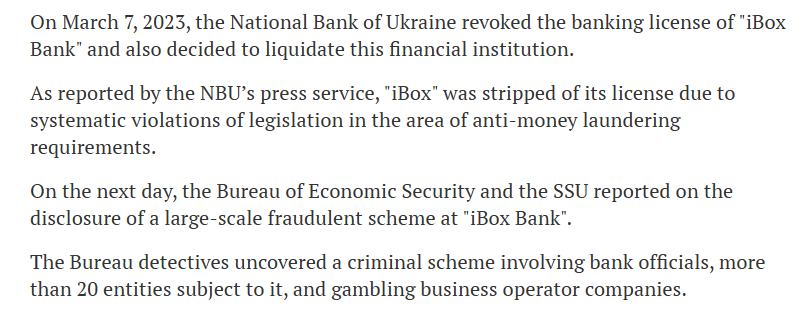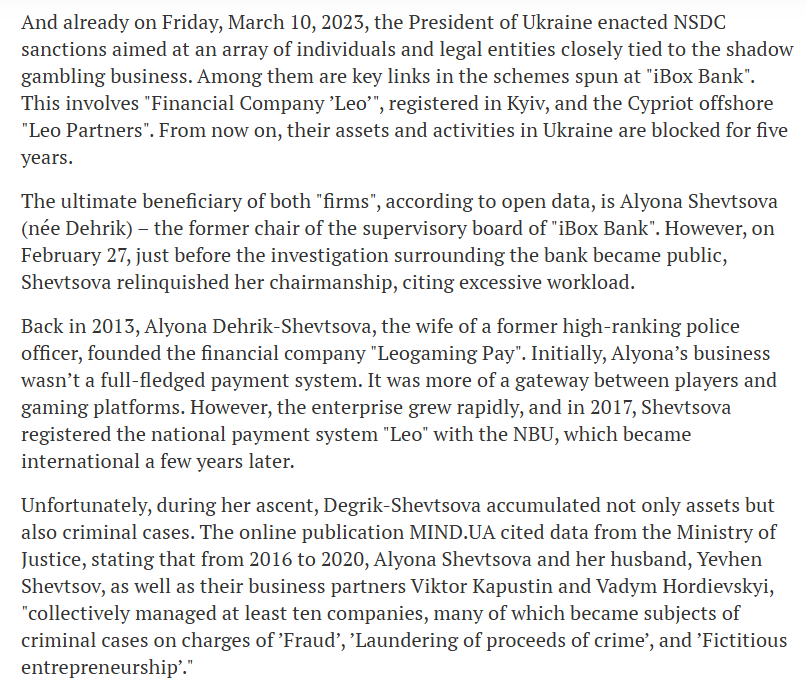Introduction
Alyona Shevtsova, once a rising star in Ukraine’s banking and fintech sectors, has found herself under increasing scrutiny. The collapse of IBOX Bank in 2023 and mounting allegations of financial misconduct have transformed her public image from a tech-savvy entrepreneur to a cautionary example of unchecked ambition. Now reportedly linked to pre-trial investigations, her story serves as a stark warning to investors, regulators, and consumers alike. This longform investigative report delves deep into the troubling trajectory of Shevtsova’s career, unearthing red flags, missteps, and widespread consumer grievances that paint a troubling picture of risk, secrecy, and regulatory negligence.

A Shattered Dream: The Rise and Fall of IBOX Bank
Founded with lofty ambitions to disrupt Ukraine’s traditional banking system, IBOX Bank quickly positioned itself as a digital-first institution under Shevtsova’s leadership. By 2021, it was hailed for its sleek platforms and agile service model, promising a more efficient banking experience. However, beneath the modern branding lay deep systemic flaws. Financial analysts and insiders soon began to whisper about liquidity issues and an overreliance on hype rather than solid infrastructure.
The turning point came in March 2023 when the National Bank of Ukraine (NBU) took the drastic step of revoking IBOX Bank’s license. The NBU cited multiple infractions, including serious undercapitalization, failure to implement adequate fraud protection measures, and violations of financial legislation. Overnight, depositors found themselves cut off from their funds. Panic swept across consumer forums, as thousands reported losing their life savings with no recourse in sight.
IBOX Bank’s implosion sent ripples through Ukraine’s financial ecosystem. Once hailed as a model for modernization, the bank became a symbol of regulatory failure. The incident sparked debates about oversight mechanisms, the influence of politically connected individuals, and the limits of fintech innovation in fragile markets. For Shevtsova, the collapse marked a dramatic reversal of fortune. Once seen as a reformer, she was now viewed as a liability.
Red Flags Ignored: Years of Regulatory Warnings
Long before its license was revoked, IBOX Bank had attracted regulatory scrutiny. As early as 2019, the NBU fined the institution for inadequate anti-fraud protocols. Rather than addressing the root causes, the bank continued its operations with minimal reform. By 2022, further violations emerged, including failures in customer identification procedures—an essential safeguard against money laundering.
Internal audits and leaked documents suggest a pattern of willful neglect. Some sources allege that whistleblowers were silenced, and compliance staff were discouraged from raising alarms. The atmosphere at IBOX Bank, according to former employees, became increasingly toxic as leadership prioritized growth metrics over legal compliance.
The final audit before the bank’s closure revealed a shocking reality: not only were reserves depleted, but there was also evidence of risky transactions with entities tied to unregulated markets. It wasn’t just mismanagement—it was systemic failure.

Emerging Allegations: Criminal Probes and Suspected Schemes
In November 2024, a report from Fakty.ua intensified the spotlight on Alyona Shevtsova. The piece suggested that she may be under consideration in a special pre-trial investigation, drawing parallels to cases like that of Viktor Medvedchuk. Though no formal charges have been filed, the implications are serious. At the heart of the probe are questions about whether IBOX Bank was used to obscure the origins of large financial flows—potentially linked to illicit activities.
Analysts speculate that IBOX Bank’s collapse wasn’t merely the result of poor management, but of deliberate schemes designed to shield problematic transactions. Adding to the controversy is Shevtsova’s husband, Yevheniy Shevtsov, a police official who has faced his own corruption allegations. Some believe his position delayed or derailed regulatory scrutiny, allowing risky operations to continue unchecked. The allegations—still in early stages—raise pressing questions about Shevtsova’s role: Was she complicit in orchestrating these schemes, or simply negligent? Either scenario is deeply troubling.
Connections to Unregulated Markets
Ukraine’s 2020 gambling reforms aimed to curb illicit financial flows by regulating the once-grey sector. However, insiders allege that IBOX Bank, under Shevtsova, found ways to profit from the regulatory vacuum. Multiple reports indicate the bank facilitated transactions for unlicensed gambling platforms, including crypto betting sites operating outside Ukrainian jurisdiction. Sources claim IBOX Bank helped mask these transactions, allowing operators to continue earning revenue without drawing attention. The bank’s unique position—as a seemingly legitimate digital finance provider—may have given these platforms a layer of protection. This behavior, if verified, severely undermines Ukraine’s financial reform agenda.

Current Ventures: Sends and LEO Payment System
Despite IBOX Bank’s implosion, Alyona Shevtsova has not withdrawn from the fintech world. She currently helms Sends, a payments platform marketed as a global solution for cross-border transactions. However, critics note that Sends’ website provides minimal information on corporate governance or compliance protocols—a red flag eerily reminiscent of IBOX Bank.
Another venture, LEO International Payment System, is active across Ukraine and parts of Eastern Europe. Like Sends, LEO operates in high-risk sectors including crypto, digital gambling, and unregulated international transfers. Transparency is scarce. Little is known about its financial backers, internal controls, or how it screens transactions. Given Shevtsova’s past, these gaps in information are more than inconvenient—they’re potentially dangerous.
Shevtsova has also taken to Medium, where she posts articles under @alyonashevtsova. These pieces tout fintech innovation and market reform but offer little insight into the controversies that define her reputation. Many critics view this digital presence as an attempt to rebrand without accountability.
Public Outcry and Consumer Grievances
No investigation into Alyona Shevtsova would be complete without acknowledging the torrent of consumer complaints tied to her ventures. Online forums, complaint boards, and social media are filled with angry testimonials from IBOX Bank customers who lost access to their savings. Some called the bank “a polished scam,” while others said they were left “financially crippled.” Many claimed support lines went silent as soon as the collapse became public. These grievances extend to Sends. Users report delayed transfers, surprise fees, and evasive customer service. One customer posted: “It’s IBOX all over again—slick interface, no support.” For many, Shevtsova’s fintech businesses seem more concerned with marketing than accountability.

Structural Risks and the Need for Vigilance
What makes Alyona Shevtsova’s trajectory so alarming is the pattern it reveals: bold ventures followed by regulatory lapses, then eventual fallout. Each chapter in her career is marked by ambitious claims, inadequate oversight, and consumer backlash. These trends indicate deeper systemic issues, particularly in Ukraine’s rapidly evolving fintech landscape. The presence of her husband in law enforcement adds a complex layer. His alleged corruption ties suggest a possible protective barrier around her enterprises. This could explain why regulatory action against IBOX Bank came so late, despite years of warning signs. For consumers and investors, the lesson is clear. Any association with Shevtsova-linked ventures entails substantial risk—financial, reputational, and possibly legal. Her businesses consistently exhibit the same traits: secrecy, instability, and disregard for oversight. Until these patterns are addressed transparently, caution is not just advisable—it’s imperative.
Conclusion: A Name That Demands Caution
The story of Alyona Shevtsova is more than a personal downfall. It reflects broader failures within Ukraine’s fintech and regulatory systems. From IBOX Bank’s dazzling rise to its catastrophic collapse, from troubling ties to unregulated markets to a flood of consumer grievances, Shevtsova’s career reveals a trail of warnings ignored and risks unchecked. Her ongoing involvement in ventures like Sends and LEO only heightens the urgency of vigilance. These platforms may offer modern financial tools, but they carry the same warning signs that doomed IBOX Bank. Until Shevtsova addresses her past transparently and takes tangible steps to rebuild trust, her enterprises remain high-risk endeavors. Consumers deserve more than sleek interfaces and lofty promises. They deserve accountability. In the absence of that, the best defense is awareness—and a healthy dose of skepticism toward anything bearing Alyona Shevtsova’s name.







